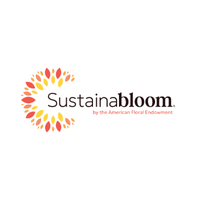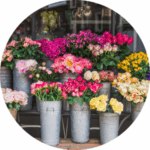In today’s floral industry, sustainability is no longer a side conversation or a marketing checkbox. It has become a practical driver of business success. Wholesalers who can connect sustainable practices with measurable improvements in quality, efficiency, and customer loyalty are finding that doing good for the planet can also mean doing well financially.
WFFSA and AFE’s Sustainabloom program share a common goal: helping the floral supply chain thrive through science-based, actionable sustainability. The opportunity is not just to reduce impact, but to increase sales by offering products and services that last longer, perform better, and create value for florists and their customers.
 The Science Behind Sustainable Profitability
The Science Behind Sustainable Profitability
Preliminary Research from AFE Sustainabloom shows that flower loss across the supply chain is significant, with a large percentage occurring after harvest during transport and at wholesale or retail level. Each stem that fails to reach a vase represents lost revenue, wasted resources, and unnecessary emissions. In other words, when waste is reduced, profits rise.
Sustainability, in this sense, is about resource efficiency. Reducing water use, improving temperature control, optimizing transport, and cutting shrink are all examples of environmental actions that make economic sense. When wholesalers view sustainability through the lens of operational efficiency, it becomes clear that it is not a cost but a growth strategy.
Care and Handling: Sustainability Starts with Quality
Every flower that arrives healthy, hydrated, and ready for sale represents a success in both sustainability and customer service. Good care and handling practices are the most direct way to reduce waste and improve quality.
Proper hydration, clean buckets, the right solution concentrations, and consistent temperature control prevent bacterial buildup and keep stems at peak condition. These actions extend vase life, which strengthens confidence among florists and leads to repeat orders.
A longer-lasting flower is a sustainable flower. It means fewer replacements, less product loss, and happier customers who see real value in what they buy. Wholesalers who provide education on handling protocols or demonstrate the benefits of following them are not only improving product outcomes but positioning themselves as trusted advisors.
Packaging and Materials Matter
Packaging is another area where sustainability can support sales. Across the floral industry, companies are rethinking sleeves, wraps, boxes, and containers with recyclability and resource use in mind. Moving toward paper or reusable materials, or incorporating post-consumer recycled content, shows leadership and resonates with customers who want to reduce their own environmental footprint.
These changes are visible and tangible, which makes them powerful tools for storytelling. A florist who receives flowers in recyclable or responsibly sourced packaging can pass that message on to their customers. The wholesaler becomes part of that value chain, adding credibility and appeal to every transaction.
Even modest improvements add up over time. A shift to lighter or reusable packaging can cut costs while supporting environmental goals, reinforcing that sustainability and savings can go hand in hand.
Education and Communication: Empowering Customers
Many florists care deeply about sustainability but are unsure how to communicate it. This is where wholesalers can provide real leadership. By sharing credible information grounded in research from AFE’s Sustainabloom, wholesalers can help florists tell better stories to their consumers.
Examples include sharing simple data on vase-life extension, explaining how proper hydration reduces waste, or providing educational signage that highlights environmental benefits in practical terms. This information could be shared through phone conversations during the ordering process, special inserts included in orders, in-store signage or social media posts. When customers understand the science behind sustainability, they are more likely to value the service and reward it with loyalty.
Remember that honest, transparent communication also builds trust. Avoiding vague claims and focusing on measurable benefits helps set a higher standard for the entire supply chain.
Collaboration Across the Supply Chain
Sustainability is not achieved in isolation. It requires collaboration between growers, suppliers, wholesalers, and retailers. WFFSA’s role is to connect these stakeholders, facilitating dialogue and the sharing of best practices that lift the entire industry.
AFE’s Sustainabloom can help provide the scientific foundation, translating research into accessible insights that businesses can use. Together, these organizations help bridge the gap between academic knowledge and real-world application.
When wholesalers share data, test new methods, or participate in pilot programs that measure waste reduction or resource savings, they contribute to collective learning that benefits everyone. Collaboration ensures that sustainability becomes part of the industry’s culture rather than an individual effort.
Turning Sustainability into a Sales Strategy
The final step is to translate sustainable practices into clear commercial value. Sales teams should be trained to connect these efforts directly to outcomes their customers care about. For example:
- Cleaner systems mean fewer returns and credit notes.
- Consistent care and handling mean longer vase life and higher customer satisfaction.
- Responsible packaging shows professionalism and attracts new florist accounts.
- Waste reduction increases profitability per stem.
Some wholesalers are even using sustainability as a differentiator in bids, highlighting measurable improvements in shrink, logistics efficiency, or recyclability. This approach moves sustainability from the back office to the sales conversation, where it belongs.
The message to customers is simple: sustainability is not an extra step, it is part of delivering better flowers and better service.
By Mark Allen, FloraLife, in partnership with Amanda Solliday, AFE’s Sustainabloom





